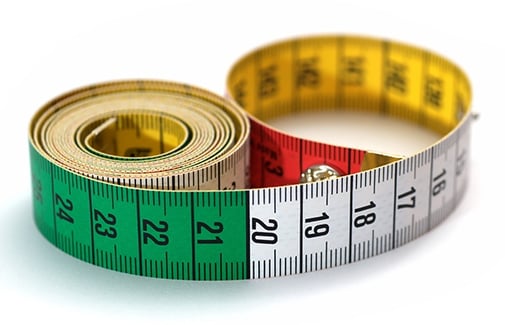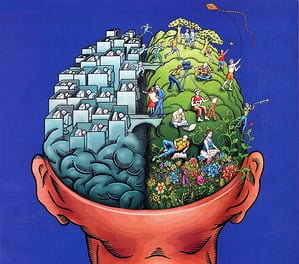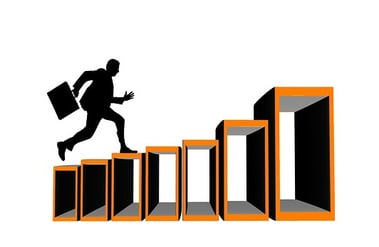
Everyone knows that scores on the SAT can make or break your college admissions chances, but can they measure your innate cognitive abilities? What do they really say about your potential?
In this article, I'll tell you what SAT scores can and can't measure and provide advice about when you might use them to estimate your own capabilities.
Do SAT Scores Measure Intelligence?
There's a big debate about this, and the question depends on how you define intelligence. Scores on the SAT do correlate with scores on IQ tests and other standardized tests of intelligence. This is unsurprising considering that the SAT was originally derived from an IQ test for army recruits.
SAT Scores Are More Variable Than "Innate Intelligence"
Despite what some may argue, it is, in fact, possible to prepare for a standardized test like the SAT. At PrepScholar, we know firsthand that students can dramatically improve their SAT scores through dedicated studying.
If a person has slightly above average intelligence, with enough preparation they should be able to get a very good or even perfect score on the SAT. Through extensive studying of question types, test content, and test format, you can do extremely well without being some kind of super genius.
But isn't the decision to prep this extensively a demonstration of intelligence (and maturity and foresight) in itself? This is where it gets a little harder to make clear judgments. Who's "smarter"—the kid who prepared for 80 hours and raised his score from a 1100 to an 1500 or the kid who got an 1500 without any prep at all? It's likely that a traditional IQ test would say that the kid who didn't prepare has a higher IQ, but in terms of SAT scores (and in the eyes of colleges) the two students are equal.
In this sense, you could argue that since students have the ability to prep for the SAT, it's a better measure of intelligence than traditional IQ tests. The score is a result of innate intelligence and perseverance. Two people can get the same score while possessing different amounts of each quality.
If we're talking about innate intelligence alone, the SAT doesn't necessarily measure accurately. If we're talking about a combination of innate intelligence and the determination that allows students to succeed in school, it may be a better metric.
 The brain is a complicated place. And clearly this artist is biased towards the right brain even though the whole idea of people being right or left brained is bogus.
The brain is a complicated place. And clearly this artist is biased towards the right brain even though the whole idea of people being right or left brained is bogus.
It's Not Quite That Simple, Though—There Are Other Reasons Why The SAT Isn't an Ideal Measure of Intelligence
The SAT would do a better job of measuring academic ability and intelligence if high schools across the country were all equivalent in their funding and quality, but that isn't the case. Students have different educational backgrounds, and this strongly affects performance on the SAT.
Many students may have strong combinations of innate intelligence and perseverance but are unable to utilize these qualities to do well on the SAT due to circumstances beyond their control. These students might lack the extra time they need to prep, or they might not even know how to begin the prep process because their schooling so far has been low quality.
For wealthy students who grow up in a good educational system with a supportive family, it's much easier to bring out the qualities and knowledge that will allow them to succeed on the SAT. With parental pressure and monetary support, these students are more likely to enroll in prep programs and get the added benefits of this instruction on top of their already high-quality high school education. The cards are stacked in favor of these types of students even if they are of average intelligence.
So it's complicated. On the one hand, yes, SAT results can measure some degree of intelligence and academic ability. On the other hand, in some cases the SAT is not an appropriate way to judge someone's intelligence because of other obstacles they've had to face. The gap between the SAT scores of rich and poor students is a very real thing.
The SAT Is Still a Pretty Good Predictor of College Academic Success
Students who score highly on the SAT either prep extensively or are intelligent and well-educated enough in the first place to get a good score without preparation. Students who do well on the SAT are probably more prepared for college in general, but this is different from them being objectively "smarter."
Of course, every test has its problems, and the SAT certainly is flawed, but many of its shortcomings in measuring student ability and intelligence are due to societal factors beyond the control of the makers of the test. You could argue that the continued use of the test perpetuates these problems, but that's a discussion for another article!
 Then again, is anyone ever prepared for stuff like whatever this is?
Then again, is anyone ever prepared for stuff like whatever this is?
Do SAT Scores Measure Career Potential?
Different people arrive at their scores on the SAT in different ways (as discussed in the previous section), so it's tough to make these types of blanket judgments. One thing we do know is that SAT scores correlate with parental income. If by "career potential" we mean higher income, then yes, SAT scores can roughly measure the likelihood that a student will end up earning a high income as an adult. Students who earn high SAT scores are more likely to have parents who can support them in college and help them connect with more job opportunities in lucrative fields.
The SAT does help provide some poor students with more opportunities to attend college, but it can also contribute to keeping people where they are on the economic ladder. As I've said, though, there are far more complex and deep-rooted societal forces at play here than standardized testing.
The SAT can measure career potential to a very limited degree, but there are so many other factors that exist in the job market that nothing is set in stone. The skills you'll need to do well in a job may be very different than the skills you needed to do well on the SAT.
Since the SAT tests knowledge of relatively simple concepts and ideas, it may not be the best predictor of whether someone will do well in an advanced job that requires a lot of specialized knowledge. It also won't be able to measure a person's emotional intelligence and ability to manage others, which are key factors in determining whether someone will advance in most job fields.
The revised 2016 SAT represents an effort by the College Board to remedy these issues with the test. The goal of the current format is to test material in a way that makes more practical sense and considers the skills that students will actually need upon entering the job world.
Setting aside the extra features of the latest version of the SAT, judgments of career potential need to take education level and major type into account. On average, STEM majors make more money than humanities majors even if both students have equal test scores and equal overall intelligence.
If you plan to use your SAT scores to judge whether you'll succeed in a career field in the future, you should think twice. There are many other factors, including your specific career interests, the amount of prep time you put into the SAT, and the educational experience you had in high school that may make your scores more or less indicative of your potential.
 If you work hard, you too can have a career in jumping up to progressively higher orange rectangles. This guy is really living the dream.
If you work hard, you too can have a career in jumping up to progressively higher orange rectangles. This guy is really living the dream.
What Will Your SAT Scores Really Tell You? Should You Listen?
Is it useful for you to judge yourself based on the results of a standardized test? In some cases yes, and in other cases definitely not.
SAT Scores Are a More Useful Measurement If:
You're Planning to Apply to Colleges That Require Standardized Test Scores
If the colleges where you're applying consider SAT scores in their admissions decisions, you'll have to make judgments about where to apply based on your performance. Your SAT scores will help you estimate your admissions chances at different colleges. After comparing them to the statistics, you can set logical improvement goals or make an informed choice not to waste time applying to schools that are too selective based on their average score ranges.
You Have a Low GPA
If you have a low GPA, you should take your SAT scores more seriously as a measurement of your ability. High scores can make a big impact on your chances of college admission even if your overall performance in high school wasn't great. If you earn high scores with a low GPA, your scores might also compel you to think more critically about why you're doing poorly in school. High scores might indicate that your academic potential is greater than you thought.
Your Scores Are Especially High or Low
If you have extreme SAT scores (outside the average range of 1000-1100), they may be a more useful measurement of your abilities. If your score is lower than 1000, consider whether you have any major knowledge gaps you need to address that might cause you problems later in college. If your score is higher than 1100, you can assume that you have fairly strong reasoning abilities and knowledge of basic high school subject matter.
 If your scores are XTREME, you should pay more attention to them.
If your scores are XTREME, you should pay more attention to them.
SAT Scores Are a Less Useful Measurement If:
You Plan on Applying to Test Optional Colleges
If you're planning on applying to colleges that don't require you to submit SAT scores, there's no need to consider the SAT as a measurement of your ability. You don't have to show your scores to these colleges if you choose not to, so your performance won't impact your chances of admission negatively.
You Have a High GPA
If you have a high GPA, your SAT score is a less critical measurement in the college application process. It's still important if you want to attend competitive schools, but you have the option of applying to test optional colleges or less competitive schools where your high GPA will be enough to prove your academic qualifications. When I say a "high GPA," I mean any GPA that indicates that you've earned mostly As in challenging classes. This could be anywhere from a 3.7 to a 5.0 depending on whether your school uses a weighted or unweighted GPA scale.
Even if you have an SAT score that's not stellar, you'll most likely be able to get into college based on your high GPA. You may still have some trouble if your SAT score is below average (lower than 1000). However, if you have a low SAT score and a high GPA, this might mean that the SAT isn't a useful way for you to measure your academic abilities.
The Bottom Line: Don't Judge Yourself too Harshly Based on Your SAT Scores
SAT scores represent a limited measurement of cognitive abilities. They can vary greatly based on each student's level of preparation and high school experiences. You should pay attention to scores that are especially low or high so you're aware of your strengths and shortcomings in the context of the material that's being tested, but don't let your SAT scores completely dictate judgments about your potential. If you're really concerned about your scores, you can improve them by following a focused study plan!
What's Next?
Not sure whether your SAT score is "good enough"? Read my article on the different ways you might define a good SAT score based on your personal goals.
If you're trying to raise your scores, check out these 15 tips that will help you do better on the SAT without too much extra studying.
If you've taken the SAT multiple times, you might not be sure which score will be the most relevant when applying to college. Find out which SAT scores colleges will look at when judging your application.





